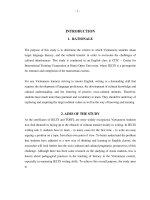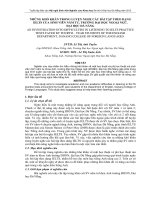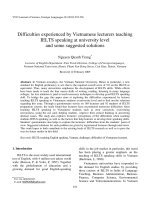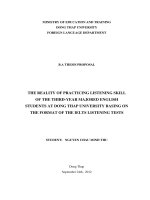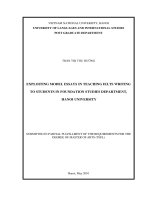ielts
Bạn đang xem bản rút gọn của tài liệu. Xem và tải ngay bản đầy đủ của tài liệu tại đây (8.62 KB, 1 trang )
It is widely acknowledged that there is an inextricable link between
watching TV and the development of children’s personality. However, whether
the content or the quantity of time allocated for such a pastime affects their codes
of conduct triggers a source of debate. This essay aim to analyse both sides of this
issue in depth before my conclusion is drawn.
On the one hand, that the information that children access affects their
behaviors is supported by some. The important explanation for this issue is their
innocent and curious nature. In fact, children are so immature that they fail to
distinguish right from wrong. As a result, it is highly likely that children can
imitate and develop inappropriate behaviors later without sufficient awareness,
especially in the absence of parental guidance. To illustrate, those who get
exposed to brutally violent scenes during their formative years are likely to be
noncompliant and stubborn, and thus they are more vulnerable to psychological
disorders. Therefore, what is shown on the television exerts a substantial effect
on the way that children behave.
On the other hand, some maintain that TV viewing duration of children
induces some changes in their personality. It is true that excessive exposure to TV
deprives the young of time to get involved in social activities. Thus, a paltry
amount of time is left for face-to-face conversations and other morally-beneficial
activities which help them mold their personality. Even worse, some children
spending a large number of hours sticking their eyes to the screen tend to
experience social isolation or autism. Thus, the quantity of time spent on such a
recreational activity influences children’s behavior patterns.
In conclusion, both information children receive and duration that they
spend on television programs have a certain role to play in the formation of their
behaviors. In my opinion, the content shown on television greatly impacts on
their moral standards.
